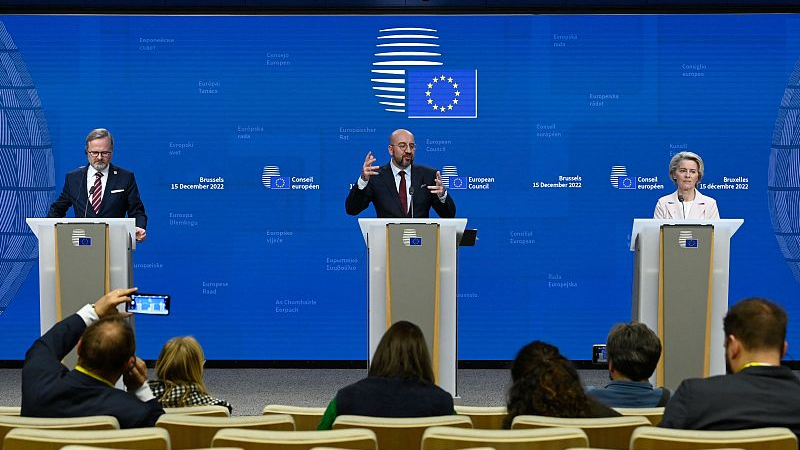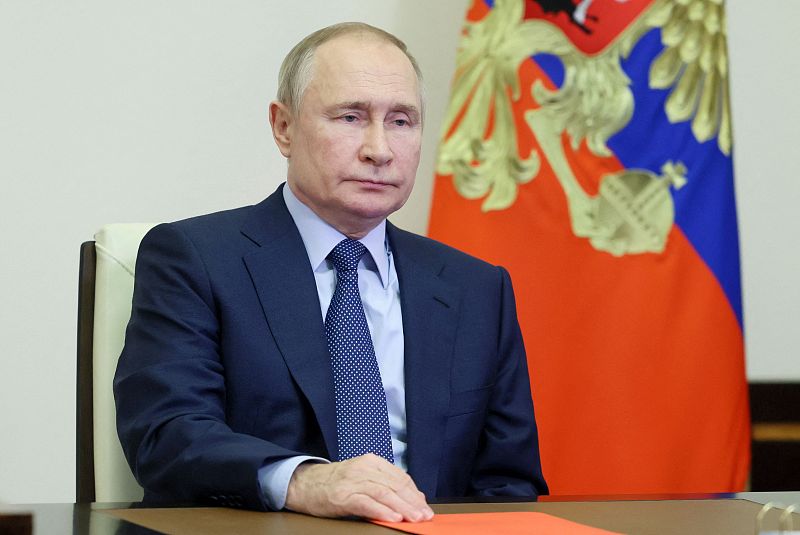
L-R: Czech Republic's Prime Minister Petr Fiala, President of the European Council Charles Michel and European Commission President Ursula von der Leyen attend a press conference at the end of the European Council Summit in Brussels, Belgium, December 15, 2022. /CFP
L-R: Czech Republic's Prime Minister Petr Fiala, President of the European Council Charles Michel and European Commission President Ursula von der Leyen attend a press conference at the end of the European Council Summit in Brussels, Belgium, December 15, 2022. /CFP
European Union unity over sanctions on Russia has started to falter as jitters about the impact on Europe's own stumbling economy weakens resolve to punish Moscow.
EU leaders agreed on Thursday to a ninth package of sanctions but talks were acrimonious, with Poland and the Baltic states that neighbor Russia campaigning for tougher measures, while states further west, such as Germany, were more hesitant.
Some, such as Belgium and Greece, as well as Hungary, which still relies heavily on Russian energy imports, pushed back against further sweeping measures.
"It is becoming increasingly difficult to impose sanctions that hit Russia hard enough, without excessive collateral damage to the EU," a spokesperson for Belgium's government said ahead of the deal at the EU leaders' summit.
After the Russia-Ukraine conflict erupted in February, the EU unitedly responded with swift steps against Russia. Sanctions have already been imposed on a range of companies and Russian individuals, while overflights by Russian planes have been banned and business with several Russian banks barred.
But finding common ground now has become tougher.
Countries pro sterner sanctions
Lithuania and others objected to moves exempting a handful of Russian political and business figures involved with agriculture and fertilizers, although that dispute was defused in the end.
Poland and the Baltic states, closer to the frontline, circulated a proposal in recent weeks for more far-reaching sanctions, including on Russian gas and its nuclear industry, and arguing against exemptions, such as on sales of Russian steel and diamonds.
Some in that group want Gazprombank, central for energy payments to Russia, to be targeted, while many countries were reluctant, so these issues would be discussed in 2023.
For some European politicians, such as those from Poland which faces fighting on its doorstep, the hesitancy of other states to support sterner steps has proved frustrating.
"We will demand Germany change its policy. It's not fair for Germany to rely on Poland to defend it from the threat of war," said Radosław Sikorski, Poland's former foreign minister and now a member of the European Parliament.

Russian President Vladimir Putin chairs a meeting with members of the Security Council via a video conference at the Novo-Ogaryovo state residence, outside Moscow, Russia, December 16, 2022. /CFP
Russian President Vladimir Putin chairs a meeting with members of the Security Council via a video conference at the Novo-Ogaryovo state residence, outside Moscow, Russia, December 16, 2022. /CFP
Concerns of more sanctions
European diplomats and officials, speaking during this week's talks, said that the bloc was nearing its limits as energy prices rocketing higher has driven up inflation.
Hungarian Prime Minister Viktor Orban campaigned at home against sanctions, using posters showing such punitive measures as bombs destroying Hungary's economy. Others are more discrete, while some have half an eye on a future relationship with Russia after the war ends.
German Chancellor Olaf Scholz said this month that the EU would "tighten the sanctions against Russia" as long as the conflicts continue, adding relations were now "being reduced, reduced, reduced" but there should be an opportunity for economic cooperation again when the conflicts end.
Meanwhile, existing EU measures are not always watertight. The EU imposed a price cap on seaborne Russian oil deliveries, but its crude is selling below that level, so revenues still flow to Moscow.
The cap was billed as further punishment for Russia but some officials say the main impact is to water down the bloc's own curbs on the oil trade as, provided the price stays below the cap, European insurers can underwrite Russian shipments.
The oil cap – designed to align the whole of the EU with the United States – was adjusted in a nod to Greece and Cyprus, which have large tanker fleets, people familiar with the matter said.
"Now we are careful with sanctions, so that we don't go so far that we would totally damage the European economy," said Edita Hrda, the ambassador to the European Union of the Czech Republic, which holds the EU presidency.
"If we push certain steps against Russia, it could cost some political leaders their jobs. We need to give the countries time to adjust," said Hrda, who chaired meetings of EU countries, including those that set the shape of the most recent sanctions.
(With input from Reuters)